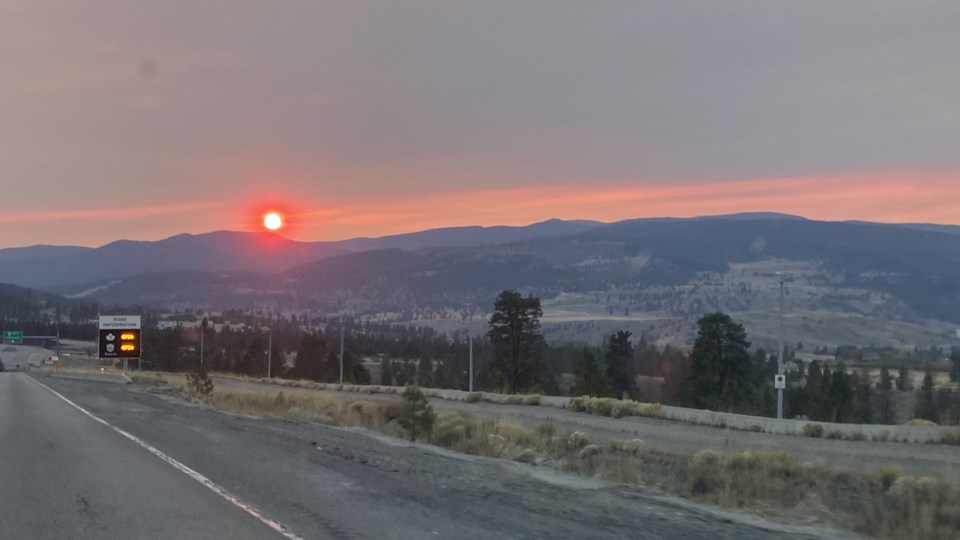British Columbia’s largest urban area registered some of the worst air quality in the world Monday morning as wildfires continued to blanket the region in fine particulate matter.
As of 10 a.m. Monday, the Vancouver region had the 15th worst air quality of any city on the planet — worse than chronically polluted cities like Mexico City or Jakarta, according to global air quality monitoring network IQAir.
“Stagnant weather conditions are forecast to persist for several days and it is expected that air quality may not change until there is a more significant change in the weather,” said a spokesperson for Metro Vancouver in a press release over the weekend.
Environment Canada forecast that a chance rain could fall on the drought-stricken coast won’t come until Friday, Oct. 21.
Much of B.C.’s Mainland coast and Vancouver Island have faced drought conditions for months, in some cases leading to mass die-offs of returning salmon stranded in dry river beds; in other communities, officials are working to manage dwindling water supplies.
The number of active fires in B.C. climbed to 210 from 200 since last week, according to the BC Wildfire Service. Over that period, the service has expanded the danger rating for wildfires to extreme levels for nearly all of the South Coast and the southern half of Vancouver Island. Pockets of Interior, central and a band of the Peace region face similar tinder-dry conditions.
In some corners of the region, the air quality was much worse. On the North Shore, IQAir reported an Air Quality Index (AQI) rating of 171, an “unhealthy” level that would rank the station as fifth worse among the planet’s larger heavily polluted cities.
“Unhealthy” AQI readings mean some members of the general public may experience health effects, whereas sensitive groups — including seniors, children and people with pre-existing conditions — may face serious health effects.
Up the Fraser Valley, meanwhile, an air quality station in Chilliwack recorded an AQI of 240 as of 10 a.m. Monday — a “very unhealthy” reading worse than the current air quality in notoriously smoggy Delhi, India.
“Very unhealthy” means there is a risk of health effects for every resident in the air shed.
But the worst air quality in the Fraser Valley and Metro Vancouver region was reserved for Sunshine Valley near Hope. An air quality station there reported an AQI reading of 471, far beyond the 300 required to be categorized as “hazardous.”
At that level, health warnings are issued in areas under the U.S. AQI. The index, which acts as a “yardstick that runs from zero to 500,” reflects the highest concentrations of either particulate matter, ground-level ozone, carbon monoxide, sulphur dioxide or nitrogen dioxide.
In 25 B.C. communities, however, a different metric, known as the Air Quality Health Index (AQHI), is used.
The AQHI scale ranges from one on the low end to 10+ on the high end. When conditions worsen across the Lower Mainland or Fraser Valley, Metro Vancouver issues warnings to the public.
On Sunday, the regional body renewed its air quality advisory for Metro Vancouver and the Fraser Valley due to high concentrations of fine particulate matter from wildfires burning near Chilliwack, Hope and over the border in Washington State.
As of Monday morning, particulate matter triggered AQHI levels ranging from eight in the Eastern Fraser Valley to two in southeast Metro Vancouver.
Fine particulate matter, also known as PM 2.5 because of its 2.5 micrometre or less diameter, can easily enter homes and buildings.
People with lung disease, respiratory infections, COPD, asthma and diabetes face elevated risk when exposed to the fine particles, but so do pregnant women, children, seniors, outdoor workers and people who are unhoused.
Relief can be found in homes or buildings with HEPA air filters, such as community centres, libraries and malls.
Portable HEPA filters can also be bought and set up to create a clean air space in your home.
If health problems due to fine particulate matter escalate — leading to shortness of breath, coughing or chest discomfort — seek medical attention or call 911 if it’s an emergency.




